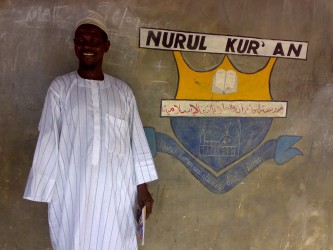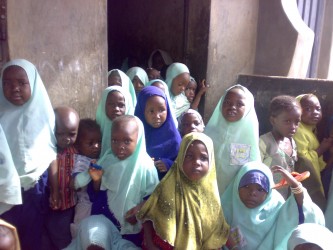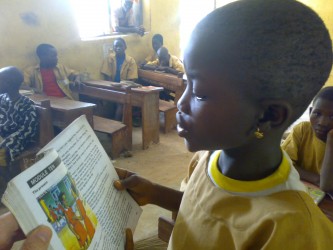Apologies for not writing recently, in particular to Iphie, Iyinoluwa, Yassin and Elizabeth who gave such informed and passionate responses on the situation in the Niger Delta that I raised in my post about the Maureen Matheny Academy in Bayelsa State. You guys really helped me to understand new dimensions to the tragic situation there, as did Salisu's hard hitting rap on Naija blogspot that seems to summarise most of Nigeria's current woes.
My excuse was that for the last couple of weeks I've been on the road again, from Lagos through Ilorin in Kwara State and up North to Kano and Jigawa, on a review of DFID's ESSPIN programme that is working in 5 States spread right across Nigeria. Just driving you continually see sights that surprise and amaze - the 'S*** Business is Serious Business' Portaloo compound, the massive open air Redeemer Church complex, mini-bus roadkill and the louts demanding bribes at the truck stops to name but a few on the Ibidan Expressway.
This post's title, Its Grim Up North, comes from a 90's song that lists the drab English industrial towns (where I grew up), however I want to make the point that things don't really improve as you travel north from the Niger Delta. The oil spills are replaced with deforestation and the violence diminishes, but the poverty continues unabated.
We stopped briefly at Odooran Community Primary School in Osun State at which the teachers still made formidable efforts despite glaring problems with resources and a lag on pay. At least the basics were in place, but the classrooms were run down, the children poor and the learning going on limited.

In Kano on the edge of the city in Fagge LGA we visited a Koranic school that had an enthusiastic, head teacher struggling against the odds to education hundreds of poor local children. The school straggles over 3 or 4 cement block structures, stiflingly hot, packed with kids on the floor - other children get more air under the veranda but have to contend with the stench and flies from an open sewer.

Most of the time is spent on reciting Islamic verses, but for the younger children overflowing the classes the school was little more than a holding area.

A recent innovation that DFID is keen to support Kano State's government to expand is the addition of Maths and English lessons in schools such as this. Already a single lesson of each was on offer, the limiting factor being the supply of government teachers - the others are volunteers from the community who provide the religious teaching, a commodity that is highly valued in these poor Northern back streets.

Our review visits saw evidence of poverty and need, but also innovation and the potential for change. In Kano the Education Commissioner was passionate about getting more girls into better quality Islamic schools that gave both religious and secular skills.
While in Kwara I saw a zeal to transform government with whole scale reforms underway to improve the College of Education, and introduce 'leak free' payroll systems. The enormity of the challenge is truly daunting, to provide education of an acceptable quality in all Geo-Zones of Nigeria!

7 comments
Comment by R posted on
How does this work relate to the recent violence in the north, including Kano, involving the Boko Haram group who are against western education?
Comment by Ian Attfield posted on
Certainly the news about the violence involving Boko Haram ("Western education is sin") is very worrying, as is the very fact that 'Western education' can be perceived as a threat by anyone. The vast majority of Islamic and traditional leaders in Northern Nigeria have disowned the recent actions and threats, having recognised the many benefits of a well rounded education for all young Nigerians.
Unfortunately Nigeria is prone to outbreaks of violence such as this - e.g. hundreds dead following the local elections in Jos last year - happen all too frequently. While headline reasons around religion and ethnicity are often given, the high levels of poverty, ignorance and alienation experienced by the general populations quickly ignite any 'sparks'.
I hope that peace and stability can be returned quickly to the affected areas.
Comment by Bill Bartmann posted on
Excellent site, keep up the good work
Comment by Simon posted on
Why is DFID active in Nigeria? Surely the UK should withhold all funding from corrupt governments. Much of the country's wealth is still being stolen by corrupt politicians and officials. They are laughing at you.
Comment by Ian Attfield posted on
From a personal perspective I believe DFID works in Nigeria because of the huge number of poor people who live here and the potential for their lives to be transformed for the good if we can support the government to work more effectively to use its oil wealth for the public good. It is hard to make a dent in Africa's problem if you avoid working in 'difficult countries'. How can DFID support the reduction in the number out of school children for example, if 1 of 10 of them are in Nigeria and we choose not to work there?
In Nigeria donors such as DFID generally spend more funds on advisory support, capacity building and awareness: for example highlighting the problems of corruption and discrimination.
Of course corruption is a reality - we are not so naive as to claim it doesn't exist! But rather than ignore it, we have put systems in place to protect the money we give to Nigeria
Comment by Aniema posted on
So glad to read about DFID's efforts in helping get nigerians educated. my concern is more on the apparent neglect by the government of public schools which, especially in the east where i live, has led to a proliferation of private schools with fees absolutely beyond the reach of the poor. how can DFID help check this trend?
Comment by Ian Attfield posted on
AAniema, a trend over the past decades has been to open private schools in response to the failures of the government to provide reliable services - since Lagos teacher strikes of the 90's over half of all primary children are no in private schools.
DFID has been studying the phenomena, and what can be done to support and regulate these schools better in Lagos State. Clearly regulating fees and enforcing minimum standards are ways to help. In addition imporving the public schools will tip many less well off kids into the public sector.
However all these strategies take time, to reverse decades of neglect.